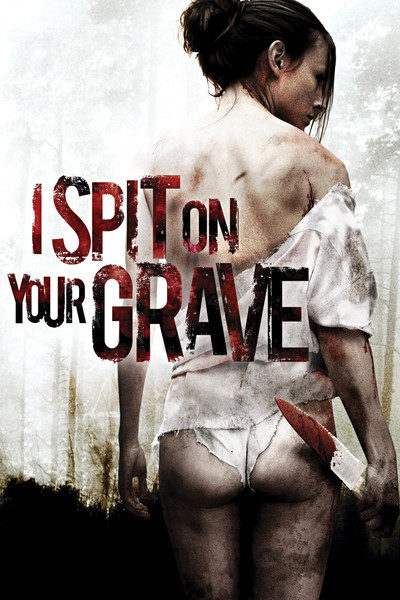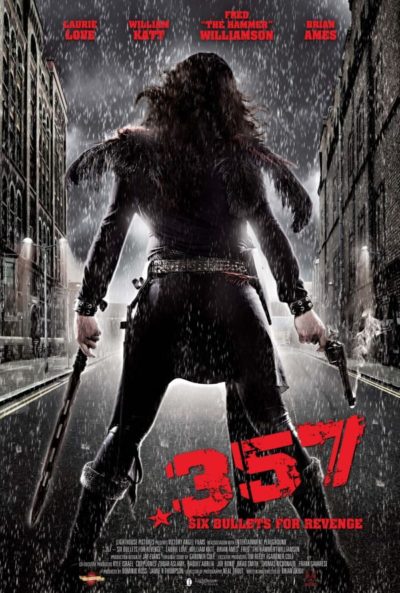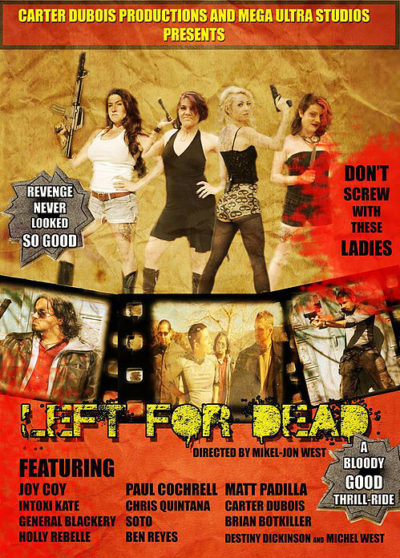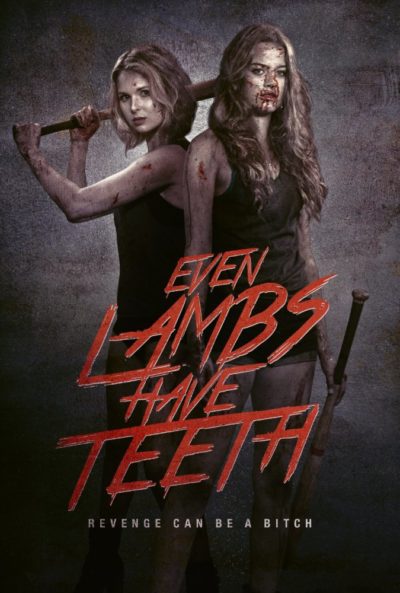★★
“Secondary staged carnage.”
 After Megan (Watson) loses her job, boyfriend and the roof over her head in the same day, she decides to head off to Atlanta, where friend Amanda (Riggs) puts her up for a bit. Amanda’s boyfriend (Rollins) is manager at a strip club, and gives Megan a job as a cocktail waitress. But after realizing the gap in earnings between those employees who keep their clothes on, and those who don’t, Megan decides to make the jump into strip-tease. This rapidly brings her into conflict with Jazz (Brown), another stripper who rules the club through terror and intimidation, along with the help of her cronies. She takes it upon herself to make Megan’s life hell. However, she can only be pushed so far, before Megan and Amanda, push back.
After Megan (Watson) loses her job, boyfriend and the roof over her head in the same day, she decides to head off to Atlanta, where friend Amanda (Riggs) puts her up for a bit. Amanda’s boyfriend (Rollins) is manager at a strip club, and gives Megan a job as a cocktail waitress. But after realizing the gap in earnings between those employees who keep their clothes on, and those who don’t, Megan decides to make the jump into strip-tease. This rapidly brings her into conflict with Jazz (Brown), another stripper who rules the club through terror and intimidation, along with the help of her cronies. She takes it upon herself to make Megan’s life hell. However, she can only be pushed so far, before Megan and Amanda, push back.
A classic grindhouse title, which somewhat delivers on its premise: nearer to the “massacre” than the “stripclub” side, I’d say. Indeed, it’s rather more restrained in terms of nudity than I’d have expected. The gore, on the other hand, is plentiful in volume, if not necessarily quality: some of the special effects count as “special” in roughly the same way as “special education”. The story is basic to the point of simplistic: Megan is somewhat sympathetic, yet you’re never brought along on her descent into psychotic violence. It’s more like a switch is suddently flipped: I can imagine the film-makers thinking, “Right, 15 minutes to go, enough of this characterization nonsense, time for the rampage sequence.” It’s still about 20 minutes too much, and this perhaps needed a better outside hand, to cut down on what often feels self-indulgent fan fiction.
The most interesting character in all this is probably Jazz. If Brown looks familiar, you should probably be somewhat ashamed of yourself. That’s because she was previously known as Misty Mundae, and starred in a large number of films with titles like Gladiator Eroticus, Lord of the G-Strings and Spiderbabe. About which, I know absolutely nothing. :) She has now moved on from such things, and clearly knows her way around a script in a way that Watson (understandably, this being her feature debut) doesn’t. Jazz thus becomes hateable, in the same way Megan should have been likeable. She’s a vicious, coke-snorting bitch, who treats the club as if it were high school, and Jazz head cheerleader. A great villain, they should have made the film around her.
As a result, Jazz’s death is about the only one which packs any kind of emotional impact – it’s not too dissimilar to one I saw in La Esquina del Diablo, actually. The rest are mostly exercises in sloppy gore – as noted, some of which work, others which don’t. For instance, the (male) death by crowbar rape is perhaps more likely to put you off tacos than anything. [They could at least have used a fireplace implement, and had Megan cheerily quip, “How’s that for strip poker?”] And why does Amanda enthusiastically join in the mayhem? No credible explanation is ever offered. It’s all very clearly a small-budget effort, made with more passion than anything else. Unfortunately, outside of Brown, it does little to escape the obvious limitations imposed by its resources.
Dir: Bob Clark
Star: Alicia Watson, Erin Brown. Courtney Riggs, Stefan Rollins
a.k.a. Night Club Massacre







 I say the above, since the father of the star here is Clint Eastwood, possibly the most famous vigilante in cinematic history. He gave us Dirty Harry, who memorably spat out lines such as, “When an adult male is chasing a female with intent to commit rape, I shoot the bastard – that’s my policy.” This apple doesn’t fall far from the tree. Though Noelle, the art student who becomes an avenging force after being raped at a party by a fellow student, takes a little longer to get to that point of unrepentant street justice. Her first victim is purely accidental, her attacker falling over a balcony after she confronts him, in the hope of getting some kind of apology. Doesn’t happen, and his death doesn’t exactly cause her sorrow. When she realizes she is also far from alone in what she has gone through, she decides that active retaliation is the best approach.
I say the above, since the father of the star here is Clint Eastwood, possibly the most famous vigilante in cinematic history. He gave us Dirty Harry, who memorably spat out lines such as, “When an adult male is chasing a female with intent to commit rape, I shoot the bastard – that’s my policy.” This apple doesn’t fall far from the tree. Though Noelle, the art student who becomes an avenging force after being raped at a party by a fellow student, takes a little longer to get to that point of unrepentant street justice. Her first victim is purely accidental, her attacker falling over a balcony after she confronts him, in the hope of getting some kind of apology. Doesn’t happen, and his death doesn’t exactly cause her sorrow. When she realizes she is also far from alone in what she has gone through, she decides that active retaliation is the best approach. This sequel is almost entirely unrelated to the original, beginning with a new, fresh character who will be tortured within an inch of her life, before escaping and roaring back for revenge. However, it manages to be a little more coherent, even as it replaces the redneckophobia of the original, with much more straightforward xenophobia.
This sequel is almost entirely unrelated to the original, beginning with a new, fresh character who will be tortured within an inch of her life, before escaping and roaring back for revenge. However, it manages to be a little more coherent, even as it replaces the redneckophobia of the original, with much more straightforward xenophobia. Having been pleasantly surprised by
Having been pleasantly surprised by  It wasn’t until the end, when the credits ran and I saw someone’s name I knew, that I realized this was actually a local production, shot here in Phoenix. Maybe I should have been paying more attention, or maybe that just speaks to the bland lack of place present in this low-budget Crow knock-off. For, despite the poster which is obviously riffing off another comic-book movie, this one is clearly inspired by Alex Proyas’s cult classic. I am, however, pleased to report that the lead star here did actually make it through the entirety of production with a pulse, so they come out ahead of their inspiration in that department.
It wasn’t until the end, when the credits ran and I saw someone’s name I knew, that I realized this was actually a local production, shot here in Phoenix. Maybe I should have been paying more attention, or maybe that just speaks to the bland lack of place present in this low-budget Crow knock-off. For, despite the poster which is obviously riffing off another comic-book movie, this one is clearly inspired by Alex Proyas’s cult classic. I am, however, pleased to report that the lead star here did actually make it through the entirety of production with a pulse, so they come out ahead of their inspiration in that department. Coming out of the micro-budget scene in New Mexico, this is a straightforward tale of vengeful “hell kittens”, to quote the official synopsis. Bella Meurta (Kate) is a hooker, who kills one of her clients after he gets rough with her. In revenge, her little sister is savagely beaten and left dead [note: not left
Coming out of the micro-budget scene in New Mexico, this is a straightforward tale of vengeful “hell kittens”, to quote the official synopsis. Bella Meurta (Kate) is a hooker, who kills one of her clients after he gets rough with her. In revenge, her little sister is savagely beaten and left dead [note: not left  Ann Willis (Robbins) is a single mother, working as a waitress and trying to keep family together after the death of her husband from lung cancer. To help out, son David (Abrahamson) abandons his plans to attend college and gets a job in a local factory. But he falls in with some questionable company there and, lured by the prospect of easy money, starts dealing drugs for the local mobsters, run by Canarsie. Things go from bad to worse after his supposed “friend” Mike (Falahee) frames him for the disappearance of some product, and things end with David’s dead body floating in the river, having been beaten to death by his associates. The cops, and in particular, Detective Frank Hogan (Baldwin), investigate – but to be honest, aren’t particularly interested in one drug-dealer being killed.
Ann Willis (Robbins) is a single mother, working as a waitress and trying to keep family together after the death of her husband from lung cancer. To help out, son David (Abrahamson) abandons his plans to attend college and gets a job in a local factory. But he falls in with some questionable company there and, lured by the prospect of easy money, starts dealing drugs for the local mobsters, run by Canarsie. Things go from bad to worse after his supposed “friend” Mike (Falahee) frames him for the disappearance of some product, and things end with David’s dead body floating in the river, having been beaten to death by his associates. The cops, and in particular, Detective Frank Hogan (Baldwin), investigate – but to be honest, aren’t particularly interested in one drug-dealer being killed. Katie (Skovbye) and Sloane (Prout) are teenage BFF’s, who head off to spend time on an organic farm – though their real goal is the weekend shopping in New York which will follow it. On the way, they are distracted by a couple of bits of prime young, rural manhood. But before you can say “roll in the hay,” they are drugged, the pair waking up to find themselves chained to duplex shipping containers, from where they are rented out as sex slaves to anyone interested. Their sudden dropping off the grid concerns Katie’s uncle Jason (Richards), who happens to be an FBI agent. He heads to the area to investigate, unaware the local sheriff is in on the plot. However, there’s only so far you can push a person, before they break. When Katie and Sloane snap, and escape, rather than heading for safety, they decide to stick around, so they can get thoroughly medieval on those responsible.
Katie (Skovbye) and Sloane (Prout) are teenage BFF’s, who head off to spend time on an organic farm – though their real goal is the weekend shopping in New York which will follow it. On the way, they are distracted by a couple of bits of prime young, rural manhood. But before you can say “roll in the hay,” they are drugged, the pair waking up to find themselves chained to duplex shipping containers, from where they are rented out as sex slaves to anyone interested. Their sudden dropping off the grid concerns Katie’s uncle Jason (Richards), who happens to be an FBI agent. He heads to the area to investigate, unaware the local sheriff is in on the plot. However, there’s only so far you can push a person, before they break. When Katie and Sloane snap, and escape, rather than heading for safety, they decide to stick around, so they can get thoroughly medieval on those responsible. Yoga instructor May (Biel) is delighted when she finally tracks down her long-lost biological sister, Shiva (Mamet) whom she has never met. However, the reunion is soured because May discovers the abusive relationship in which Shiva is embroiled. Worse is to come, as she finds out that Shiva is actually a hooker, and her significant other, Cody (Anderson), is more pimp than boyfriend. May’s efforts to help her sibling run into stormy water – not just from Cody, but also her own boyfriend, Dex (Gathegi) and adopted mother, who think Shiva and Cody are just shaking May down. Eventually, the point comes where May has to come out of this middle-class comfort-zone, because the downward dog position isn’t going to help her and Shiva escape their increasingly perilous situation.
Yoga instructor May (Biel) is delighted when she finally tracks down her long-lost biological sister, Shiva (Mamet) whom she has never met. However, the reunion is soured because May discovers the abusive relationship in which Shiva is embroiled. Worse is to come, as she finds out that Shiva is actually a hooker, and her significant other, Cody (Anderson), is more pimp than boyfriend. May’s efforts to help her sibling run into stormy water – not just from Cody, but also her own boyfriend, Dex (Gathegi) and adopted mother, who think Shiva and Cody are just shaking May down. Eventually, the point comes where May has to come out of this middle-class comfort-zone, because the downward dog position isn’t going to help her and Shiva escape their increasingly perilous situation.